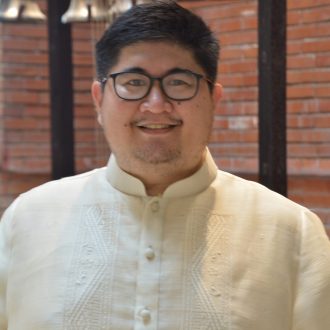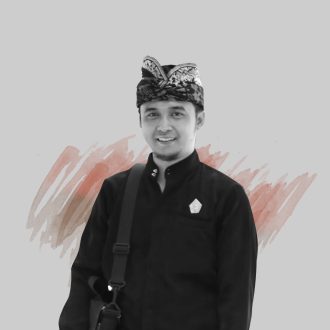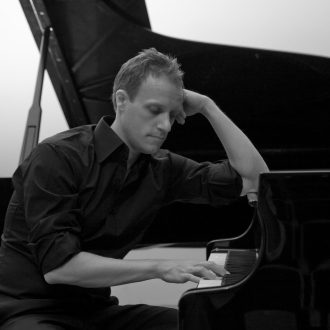Professor Dr. Sir Anril Pineda Tiatco

University of the Philippines Diliman, Department of Speech Communication and Theatre Arts, Faculty Member
Sir Anril Pineda TIATCO, PhD
Professor and Chair | Propesor at Tagapangulo
Department of Speech Communication and Theatre Arts | Departamento ng Komunikasyong Pasalita at Sining Panteatro
College of Arts and Letters | Kolehiyo ng Arte at Literatura
University of the Philippines Diliman | Unibersidad ng Pilipinas Diliman
Sir Anril Pineda Tiatco is Professor and Chair of the University of the Philippines Diliman Department of Speech Communication and Theatre Arts. He earned his PhD in Theatre Studies from the National University of Singapore and studied dramaturgy and cosmopolitan cultures at the University of Manchester. Tiatco is the recipient of the 2021 National Research Council of the Philippines Achievement Award in the Humanities. He is the Chair-Convener of the Asian Theatre Working Group, a subsidiary organization of the International Federation for Theatre Research. Tiatco is also a contributing editor for Theatre Research International, and associate editor for Humanities Diliman and Contemporary Theatre Review.
On 16 March 2020, then Philippine President Rodrigo Duterte imposed the Enhanced Community Quarantine putting the main island of Luzon – where Manila, the National Capital Region is located – on a total lockdown to prevent the spread of Covid-19. The lockdown restricted mobility, social gatherings were prohibited, and everyone was mandated to stay inside their homes. Moreover, there was a temporary closure of what were considered as non-essential establishments, including religious institutions. Being a predominantly Roman Catholic nation, religious rituals and festivals were heavily affected by the lockdown. Many of its ritualistic and festive performances involve human contact, which serve as the faithful’s direct and intimate relationship to the heavens. This presentation interrogates how cultural performances in the Philippines, mostly organised by the Church, adapted to the global health crisis. It reflects how the adaptations challenged and recontextualised the understanding of the live vis-à-vis the context of the digital or the virtual. Finally, a preliminary speculation on the future of the religious festivals in the Philippines is provided as a concluding reflection.
Associate Professor Dr. Wayan Sudirana

Institut Seni Indonesia, Denpasar, Bali, Indonesia.
Pilar Three and Four:
Approaches in Composing Balinese Gamelan Instruments
Using Electronic Instruments
I Wayan Sudirana, PhD
Faculty Graduate Studies Program
Indonesia Institute of the Arts, Denpasar
wayansudirana@isi-dps.ac.id
Abstract
A new movement has been emerged in Balinese music scene within the last decade. Young composers started to take their steps into manipulating the original sounds of gamelan through computer-based audio interfaces and/or being purely exposed to electronic music techniques. Some of them also create their artworks using video editing software and animation. When the pandemic hit Bali in early 2020, this activity developed more intensively among young emerging composers. They worked on their own in their rooms with electronic tools to create a multimedia type of work, a sharp contrast to the communal, in-person nature of traditional Balinese music composition. This paper will present works by an emerging Balinese composer to understand the compositional approaches, the techniques used in manipulating gamelan sounds, and how it correlates to traditional aesthetic aspects of playing the gamelan instruments. Some interviews about the development of electronic music with selected emerging composers are additionally included at the beginning of the paper as a background about how electronic music developed in Bali.
Keywords: Pilar, electronic, multimedia, new music, gamelan
I Wayan Sudirana is a composer and ethnomusicologist who graduated from the University of British Columbia, Canada. He diligently studied ancient music in Bali. In addition, he also studied many world music traditions, such as Samulnori music from Korea, ensemble drumming from Ghana West Africa, South Indian drumming traditions, and also some Western classical music. With this experience, he developed his music with a strong foundation to seek a new identity in the realm of new music for gamelan. He has collaborated with many composers such as Michael Tenzer, Andrew McGraw, Michael O’neil, Peter Michael Steele, Paddy Sandino, Bernard Goh, and Kim Dong Won, and has commissioned to write of piece for the opening of the Winter Olympic Games Vancouver Canada in 2010. Sudirana has written two books about gamelan Gong Luang and edited a book about Gabor, a genre in Gamelan Gong Kebyar tradition. He has written many articles published in journals with the theme of traditional approaches in studying Balinese gamelan and world music, and new music development in Bali and Indonesia. His current research is focused on the development of new music in Bali and the ancient Balinese manuscript of Gamelan philosophy and theory.
Associate Professor Dr. Ingolv Haaland

Department of Popular Music, University of Agder
The virtual artist researcher
Music technology has played a major part in popular music and electronic music and artificial Intelligence (AI) are gradually embedded in music software providing new possibilities in the decades to come. How will other genres relate to the increasing technological demands? Will the virtual space or virtual reality (VR) replace or become an addition to the physical concert format, tours and festivals as a social gathering? Digital and virtual online presence in SoMe apps are now a part of most artists’ lives and online streaming platforms facilitate global reach and fan base. Is it time to re-think the traditional concert format in virtual performances?
How will Southeast Asian music institutions prepare the future artist to meet these challenges? And how do we facilitate and disseminate virtual artistic research?
Norwegian Associate Professor Dr. Ingolv Haaland (b.1973) is a composer, arranger, pianist and scholar who have collaborated with independent artists, musicians and academic institutions in Southeast Asia and The Middle East since 2006.
Haaland published his PhD thesis Intercultural Musical Collaboration–Towards A Global Sound (2020) as an innovative stand-alone webpage (globalsoundphd.com) combining artistic research and popular musicology, with intertwined timelines. He holds a master in popular music performance (2010).
Haaland has a particular interest in Asian Traditional Music Instruments and are collaborating with Thai, Southeast Asian and Arabic artists on how to compose and perform new and innovative soundscapes rooted in the respective cultures.
As a recording artist and producer he has published six albums since 2009 and received the Norwegian National Grant as a composer (2019).
Haaland is currently employed at the Department of Popular Music, Faculty of Fine Arts, University of Agder, Norway. He is also a visiting professor at the College of Music, Mahidol University, Thailand, and a permanent member in their International Advisory Council.
He is an active member in the network organisations SEADOM and IASPM-SEA and have lectured in Thailand, Malaysia, Indonesia, Cambodia, Philippines, Lebanon and Palestine.

